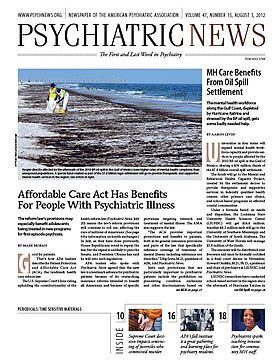A federal proposal to increase Medicaid reimbursement rates for primary care physicians is laudable, but the Centers for Medicare and Medicaid Services (CMS) should consider broadening the benefit to include psychiatrists, particularly those who coordinate all or most of their patients’ health care.
Such a move would enable psychiatric physicians to continue to treat the poor and sustain viable medical practices, APA points out in a May 16 letter to CMS Acting Administrator Marilyn Tavenner.
“The $11 billion boost that this proposed rule proposes for primary care physicians, if only routed to primary care physicians, will still do less in the way of providing Medicaid’s most vulnerable patients with access to the quality mental health care most greatly need,” wrote APA Medical Director James H. Scully Jr., M.D. “Numerous statistics evidence Medicaid beneficiaries’ heightened incidence of mental illness combined with comorbid chronic illness, like heart disease and diabetes.”
As currently written, the proposed rule would implement the Patient Protection and Affordable Care Act’s requirement that Medicaid reimburse physicians in family medicine, general internal medicine, pediatric medicine, and related subspecialties at the same levels used by Medicare in 2013 and 2014.
And the increase in payment for primary care would be paid entirely by the federal government, with no matching payment required of states, which share the cost of most Medicaid services.
“This new rule can help improve health and reduce costs by preventing illnesses before they happen and catching small problems before they turn into big ones,” said Health and Human Services Secretary Kathleen Sebelius in a press release announcing the proposed rule.
APA agrees that primary care physicians deserve greater compensation for the treatment of patients on Medicaid, as declining reimbursement rates have led many physicians to stop seeing additional Medicaid beneficiaries in recent years.
However, extending the equalization of Medicare and Medicaid pay to psychiatrists would enable a greater number of Medicaid patients to obtain psychiatric care, Scully said, while helping ensure that state Medicaid provider networks are prepared for increased enrollment as the health care reform law is implemented.
“The psychiatrists who continue to see Medicaid patients incur a substantial financial loss and frequently are deliverers of charity care,” Scully noted. “Many [APA] members say the overhead costs they incur while seeing a Medicaid patient often exceed the payment amount they receive for filing a Medicaid claim.”
